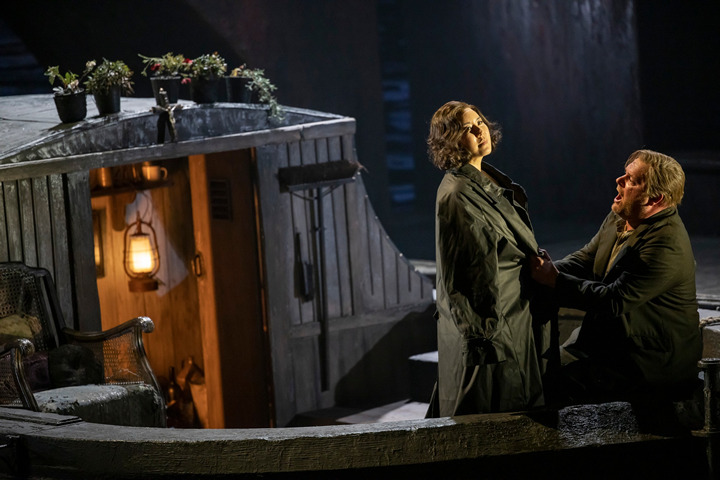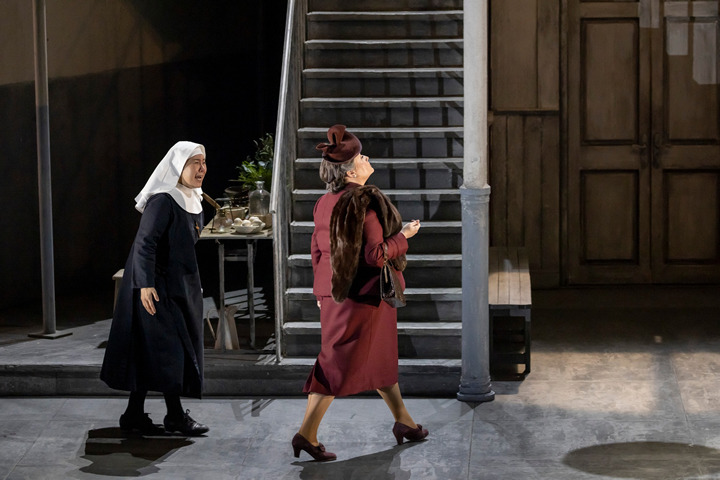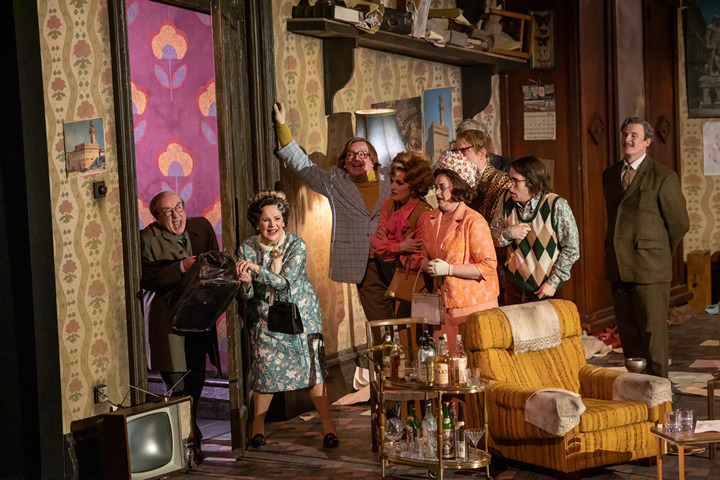| Opera Reviews | 17 May 2024 |
A night to rememberby Catriona Graham |
|
Puccini: Il trittico |
|

Il Tabarro
|
|
|
Scottish Opera’s production of Puccini’s Il trittico, directed by Sir David McVicar, is a masterclass in catharsis. Puccini did intend that his three short operas be performed together, and this production makes it clear why. After the audience has been put through the emotional wringer in Il tabbaro and Suor Angelica, the extended supper interval allows a little respite before Gianni Schicchi sends them out, drained but happy. It helps that Charles Edwards’ sets are so precisely realist and the lighting by Ben Pickersgill atmospheric, particularly in Il tabarro. The acting is superb. The stevedores have obviously had a hard day, and the sacks they are unloading from the barge are heavy. The older couple of Frugola (Louise Winter) and Talpa (Julian Close), still dreaming of a little home in the country, are a foil to Giorgetta and Michele, whose marriage has gone sour following the death of their infant child. Sunyoung Seo is excellent as the young wife who now longs for the vibrant life of her native Paris, while Roland Wood’s brooding husband Michele, unable to communicate with his wife, inexorably works out his own understanding of the situation. Viktor Antipenko is as dashing a Luigi as is possible after the day’s graft, his eyes drawn to Giorgetta despite the wearying tasks. The banality of the wharf-side setting, with the coming and going of other people, other lives, points up the ordinariness of the passions playing out. When Luigi and Giorgetta establish that they are both from the same part of town, their duet of nostalgia, of reminiscence, is another bond beyond the physical attraction. Would there have been a different outcome with a different signal from Giorgetta to Luigi? Giorgetta does not even know that was the ‘cause’ of death. All she knows is that now, she has lost everything.
|
|

Suor Angelica
|
|
|
The cold, grey décor of the nunnery in Suor Angelica echoes the coldness at the heart of the establishment. Clearly providing a sort-of refuge for unmarried mothers, that does not include any emotional support. The exuberant Sister Genovieffa (Francesca Chiejina) does jolly things up for a while, but soon a visitor arrives. It turns out to be the Aunt of Suor Angelica, Karen Cargill, implacable in a raspberry suit. It is an outstanding performance, leaving the audience with the lurking thought that she is villainous enough to tell her niece the child has died just to stop the questions, and thoughtless of the consequences. For Suor Angelica – SunYoung Seo in another excellent performance – like the mother we see during the overture, had her child taken from her seven years previously and was confined to the nunnery. Her longing for the child is heartrending, her grief at the child’s death overwhelming, her suicide agonising, the ending ambiguous. Child deaths underlie the tragedy in both the first two operas. |
|

Gianni Schicchi
|
|
|
There is nothing tragic about Gianni Schicchi except, perhaps, the fabulously hideous fashions of the late Sixties / early Seventies – thanks, Hannah Clark. The older ladies are in flowery hats and floral frocks, there is a fawn trouser suit, and Rinuccio’s burgundy cords with a slight flare are teamed with a diamond-patterned tank-top. The love of his life, Lauretta, wears a white frock which hints at Laura Ashley. When the dying Buoso finally croaks, the avaricious relatives at his death-bed anxiously seek his will, and papers lie like confetti all over the floor. The attempts to disguise this when the physician visits, and then when the notary arrives with witnesses, are all part of the chaos. Rescued (against their will) by the cunning of the eponymous Gianni (Roland Wood in his second great performance of the evening), they put themselves in his power and inevitably regret it. Francesca Chiejina (Lauretta) eschews milking ‘O mio babbino caro’, the best-known song in the evening, and sings with a forthright winsomeness. One does wonder why she thinks her beloved Rinuccio (Elgan Llyr Thomas) is such a catch, but he does show a resourcefulness apparently beyond his relatives. It is, however, invidious to pick out anyone from such a strongly ensemble performance, with each dislikeable character being carried through even in the curtain calls. Conducting the ensemble singing and the orchestra is Stuart Stratford. He brings out the musical echoes and subtleties - and the La bohème joke – in some fine playing. If, even after just the first of the three operas, the audience felt it had had its money’s worth, by the end of the evening, it was clear that this performance was more than the sum of its parts. Shakespearean in its scope, with Gianni’s final envoi from Dante to send us off into the night, this was a night to remember. |
|
| Text ©
Catriona Graham Photos © James Glossop |
|






